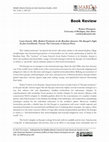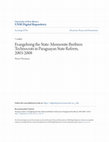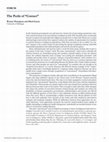Book Reviews by Warren Thompson

Middle Atlantic Review of Latin American Studies, 2019
The "radical territories" invoked in the book's title refers neither to the famed dualistic villa... more The "radical territories" invoked in the book's title refers neither to the famed dualistic village morphologies that fascinated generations of structuralists nor the metric partitioning of land by the Brazilian State. The "territory" of Laura Zanotti's book Radical Territories in the Brazilian Amazon is above all a political and moral field, a range of located strategies used by the Kayapó of Central Brazil to achieve a "good life" and an intimate relation to their lived environment. The Kayapó are no strangers to the international stage. Since the mid-1980s, they have become one of the world's most visible icons of the conservation movement by self-consciously adapting local indigenous values to the discourse and imagery of global environmentalism. Rallying an assortment of conservation groups, anthropologists, rock stars, and purveyors of lifestyle products, Kayapó leaders gained important victories against large-scale mining, energy, and agricultural interests threatening their lands.
Papers by Warren Thompson
Tipití: Journal of the Society for the Anthropology of Lowland South America, 2016
The writing of this dissertation was made possible through a Block Grant Write-Up Fellowship and ... more The writing of this dissertation was made possible through a Block Grant Write-Up Fellowship and a Rackham Fellowship from the University of Michigan's Anthropology Department. Research was funded through a doctoral research grant from the Fulbright Institute of International Education, a Rackham International Research Award from the University of Michigan, and two Dokumentation bedrohter Sprachen (DoBeS) grants administered through the Max Plank Institute for Psycholinguistics (MPI) in Nijmegen. I am grateful to these institutions for their support over the years. In particular, I wish to express my gratitude to Jost Gippert and Sebastian Drude for their advice and direction during the DoBeS grants and to Alexander Konig and Nick Wood at the MPI for technical support and the digitalization of a number of near-ruined recordings.
American Ethnologist, 2013

Middle Atlantic Review of Latin American Studies, 2019
The "radical territories" invoked in the book's title refers neither to the famed dualistic villa... more The "radical territories" invoked in the book's title refers neither to the famed dualistic village morphologies that fascinated generations of structuralists nor the metric partitioning of land by the Brazilian State. The "territory" of Laura Zanotti's book Radical Territories in the Brazilian Amazon is above all a political and moral field, a range of located strategies used by the Kayapó of Central Brazil to achieve a "good life" and an intimate relation to their lived environment. The Kayapó are no strangers to the international stage. Since the mid-1980s, they have become one of the world's most visible icons of the conservation movement by self-consciously adapting local indigenous values to the discourse and imagery of global environmentalism. Rallying an assortment of conservation groups, anthropologists, rock stars, and purveyors of lifestyle products, Kayapó leaders gained important victories against large-scale mining, energy, and agricultural interests threatening their lands.

Nicanor Duarte Frutos assumed the Presidency of Paraguay in August 2003 amidst the country’s wors... more Nicanor Duarte Frutos assumed the Presidency of Paraguay in August 2003 amidst the country’s worst financial crisis since the end of the dictatorship. With low revenues, depleted reserves, and an inheritance of defaulted debts, he had little choice but to turn to international financial institutions when he took office in August 2003. To negotiate IMF and World Bank loans, as well as to orchestrate the reforms and implement the structural adjustments that would inevitably come with it, Nicanor Duarte turned to a small group of technocrats outside his ruling Colorado Party. The technocrats in the Nicanor administration were not the “Chicago Boys”-style monetarists that that occupied so many other Latin American cabinets, but members of a the Mennonite Brethren, a remarkably insular religious sect known for its traditional distrust of the political arena. How should this departure be explained? Why, in light of a literature that posits technical expertise as the key to appointment in ...

Boletim do Museu Paraense Emílio Goeldi. Ciências Humanas, 2019
This paper provides a structural and historical overview of the kinship of a group of Tupi-Guaran... more This paper provides a structural and historical overview of the kinship of a group of Tupi-Guarani-speaking hunter-gatherers, the Ache (Guayaki) of eastern Paraguay. I begin by considering the distinguishing features of Ache kin terminology, describing its characteristic tension between the dimensions of generation and crossness, before considering arguments for historical transformations offered for similar cases in lowland South America. The Ache case shows that the “Hawaiianization” of terms in ego’s generation does not necessarily entail an inward-looking endogamy, as some anthropologists (Dole, 1969; Wagley, 1977) have argued. By describing the network of Ache foraging bands as a residence-based form of kin organization, I show that “Hawaiianization” is not only perfectly compatible with the creation of alliances over considerable distances (Asch, 1998; Ives, 1998; Hornborg, 1998), but that “Hawaiianization” and distant marriage actually work together in the production of band ...
HAU: Journal of Ethnographic Theory, 2021

Tipití: Journal of the Society for the Anthropology of Lowland South America, 2016
South American governments can and must do a better job of preventing extractivists, colonists, a... more South American governments can and must do a better job of preventing extractivists, colonists, and missionaries from encroaching on indigenous land. This should be done on principle because it respects the legal right that indigenous people have to their land. Moreover, as many anthropologists and activists have argued, it reduces the number of opportunities for outsiders to transmit diseases to indigenous populations. Still, there are limits to the so-called "no-contact" strategy as the exclusive means for preventing the spread of epidemics among vulnerable Amerindian populations that anthropologists and activists should recognize. 1 Many anthropologists and activists tend to avoid this latter point, perhaps due in part to the opacity of the term "contact" itself. The term "uncontacted," when used to describe the relations between an Amerindian group and outsiders, typically implies at least two distinct senses: the ordinary linguistic sense of being "not coming into immediate proximity" with outsiders and another sense of a group's "absence of peaceful relations" with outsiders. 2 It is in conflating these two senses of "uncontacted" that one arrives at a common argument that is as intuitively persuasive as it is misleading: Because the Mashco Piro, Nanti, Nahua, Korubo, Ayoreo, and other peoples are said to be "uncontacted" by outsiders, they are thought to be "insulated from disease" as a result. However, like Whorf's famous example of the "empty" gasoline drum that is unwittingly ignited by a cigarette ember, infectious diseases can move rapidly from a single source through a population of "uncontacted" Amerindians with disastrous consequences. 3 The protection of indigenous lands, although vital, is insufficient to be quarantined. Illegal loggers and drug traffickers operate in the remote areas of the Western Amazon precisely because the state has limited reach there. The state is no better equipped to control encounters initiated by the "uncontacted" themselves, as the Mashco Piro have done with the Cashinahua and Ashaninka. 4 These groups can acquire, and in some cases already have acquired, infectious diseases from just these sorts of encounters. This is enough to make clear that, while strategies that reduce the number of encounters between isolated groups and outsiders can reduce the probability of disease transmission, governments, anthropologists, and activists are still left with the difficult question of how best to treat epidemics among so-called isolated groups when they occur. This is, unsurprisingly, a highly contentious issue. Recent debates on how best to deal with epidemics have focused on the merits and risks entailed by preventative strategies and treatment strategies. While the differences between these approaches are certainly important, 5 both approaches recognize the need for trained medical teams capable of rapidly responding to indigenous health emergencies, undoubtedly an essential element of any effort to avoid future medical disasters. The term "uncontacted" may be helpful in pointing to issues of indigenous land and sovereignty. Essential work is needed, however, for anthropologists and activists to pressure government agencies like Peru's National Center for Indigenous Health (CENSI), Brazil's National Indian Foundation's (FUNAI) Department for Isolated Indians, and Paraguay's Institute for Indigenous Affairs (INDI) to adequately equip local medical teams where they exist and develop them where they do not. Debating the successful balance of sovereignty and health regarding isolated peoples is hindered by a term that would implicitly reduce one problem to the other.
Dissertation by Warren Thompson

Ph.D. Dissertation, University of Michigan, 2019
The concept of “ownership” has assumed some prominence in the recent anthropology of lowland Sout... more The concept of “ownership” has assumed some prominence in the recent anthropology of lowland South America (Fausto 2002; 2012; Bonilla 2005; Costa 2017). “Ownership,” as it is typically defined, is a hierarchical relation that gradually develops between an “owner” and a person owned (whether human or non-human) through continued acts of care and feeding. In this dissertation, I explore the notion of ownership through the history of settlement of one group of South American hunter-gatherers, the Ache of eastern Paraguay. Attending to ownership relations between kin, between the living and dead, between Ache and Paraguayans, and between humanity and the Christian God, I argue that hierarchical relations of ownership contain important moral presuppositions. I describe how relations are evaluated in these domains to show that an essential aspect of ownership is the evaluation of it, and the risks inherent in the relation are integral to the continuous feeding and care that sustains it.








Uploads
Book Reviews by Warren Thompson
Papers by Warren Thompson
Dissertation by Warren Thompson